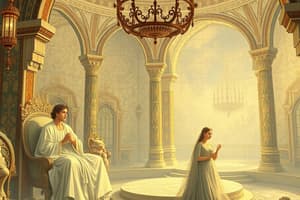Podcast
Questions and Answers
What is the classical definition of philosophy?
What is the classical definition of philosophy?
It tells of the very essence or nature of a thing.
According to contemporary definitions, what is more important than the answers in philosophy?
According to contemporary definitions, what is more important than the answers in philosophy?
Questions
Which philosopher is known as the Father of Philosophy?
Which philosopher is known as the Father of Philosophy?
- Socrates
- Plato
- Aristotle
- Thales (correct)
Match the ancient philosophers to their elements or concepts:
Match the ancient philosophers to their elements or concepts:
What characterizes the Medieval Period in philosophy?
What characterizes the Medieval Period in philosophy?
Who is considered the Father of Modern Thought?
Who is considered the Father of Modern Thought?
Rationalism and empiricism are opposing philosophical thoughts reconciled by Immanuel Kant.
Rationalism and empiricism are opposing philosophical thoughts reconciled by Immanuel Kant.
What does metaphysics study?
What does metaphysics study?
What method involves endless questioning and argument of refutation?
What method involves endless questioning and argument of refutation?
What is the aim of the scientific method?
What is the aim of the scientific method?
What does the term 'Epistemology' refer to in philosophy?
What does the term 'Epistemology' refer to in philosophy?
Who is known as the Father of Phenomenology?
Who is known as the Father of Phenomenology?
Study Notes
Doing Philosophy
- Classical philosophy defines the essence of a thing; it investigates using unaided human reason to study all aspects of existence.
- Contemporary definition emphasizes the importance of questions over answers, highlighting an ongoing inquiry.
Historical Approach
Ancient Period (World-Centered)
- Thales, known as the Father of Philosophy, marks the beginning of systematic inquiry in Western thought.
- Key thinkers and their vital elements:
- Thales - Water
- Anaximenes - Air
- Anaximander - APEIRON (the boundless)
- Heraclitus - Fire
- Empedocles - Four Elements
- Democritus - Atom
- The Great Triumvirate of Greek philosophers consists of Socrates, Aristotle, and Plato.
Medieval Period (God-Centered)
- Characterized as the Age of Belief and a Golden Age for the Christian Church.
- Focus on the ultimate causes of existence, leading to inquiries about God and truth.
Modern Period (Man-Centered)
- Known as the Age of Geniuses and the Enlightenment, with a revival of Greek achievements.
- Leonardo da Vinci exemplifies the universal man, transcending disciplines as an artist and scientist.
- René Descartes (Father of Modern Thought) emphasizes methodical doubt to seek certainty amidst skepticism.
- Rationalism prioritizes reason, while empiricism values experience.
Contemporary Period (Global/Borderless)
- Immanuel Kant, the Father of Post-Modernity, critiques modern philosophy in Critique of Pure Reason.
- Kant asserted that thoughts without content are empty, reconciling rationalism and empiricism.
Systematic Approach
- Metaphysics: Explores the nature of reality beyond the physical; includes ontology (being and existence).
- Natural Theology: Examines the existence of the divine, aiding understanding of God.
- Universal Science: Investigates fundamental principles of logic and reasoning.
- Theodicy: Seeks to prove God’s existence.
- Cosmology: Studies natural processes and the universe through empirical understanding.
- Psychology: Focuses on the principles of living beings, especially humans, related to behavior and the mind.
- Epistemology: Investigates the nature and scope of knowledge.
- Logic: Concerned with correct reasoning.
- Ethics: Explores definitions of right conduct and moral action.
Methods of Philosophizing
- Socratic/Dialectic Method: Known as elenchus, emphasizes inquiry through questioning, pioneered by Socrates.
- Cartesian Method/Methodic Doubt: Developed by Descartes, it involves systematic skepticism to achieve clear thoughts, encapsulated in the phrase "Cogito, ergo sum" (I think, therefore I am).
- Phenomenological Method: Founded by Edmund Husserl, focuses on the essence of lived experiences and consciousness.
- Scientific Method/Empirical Method: Collects empirical evidence via experiments to support or contradict theories.
- Historical Method: Involves gathering and analyzing evidence to form ideas about the past.
Studying That Suits You
Use AI to generate personalized quizzes and flashcards to suit your learning preferences.
Description
Explore the foundational concepts of philosophy in this Week 1 quiz. Discover the classical and contemporary definitions of philosophy that emphasize the nature of inquiry and human reasoning. This quiz covers key principles that shape philosophical thought and its multidimensional approach.




